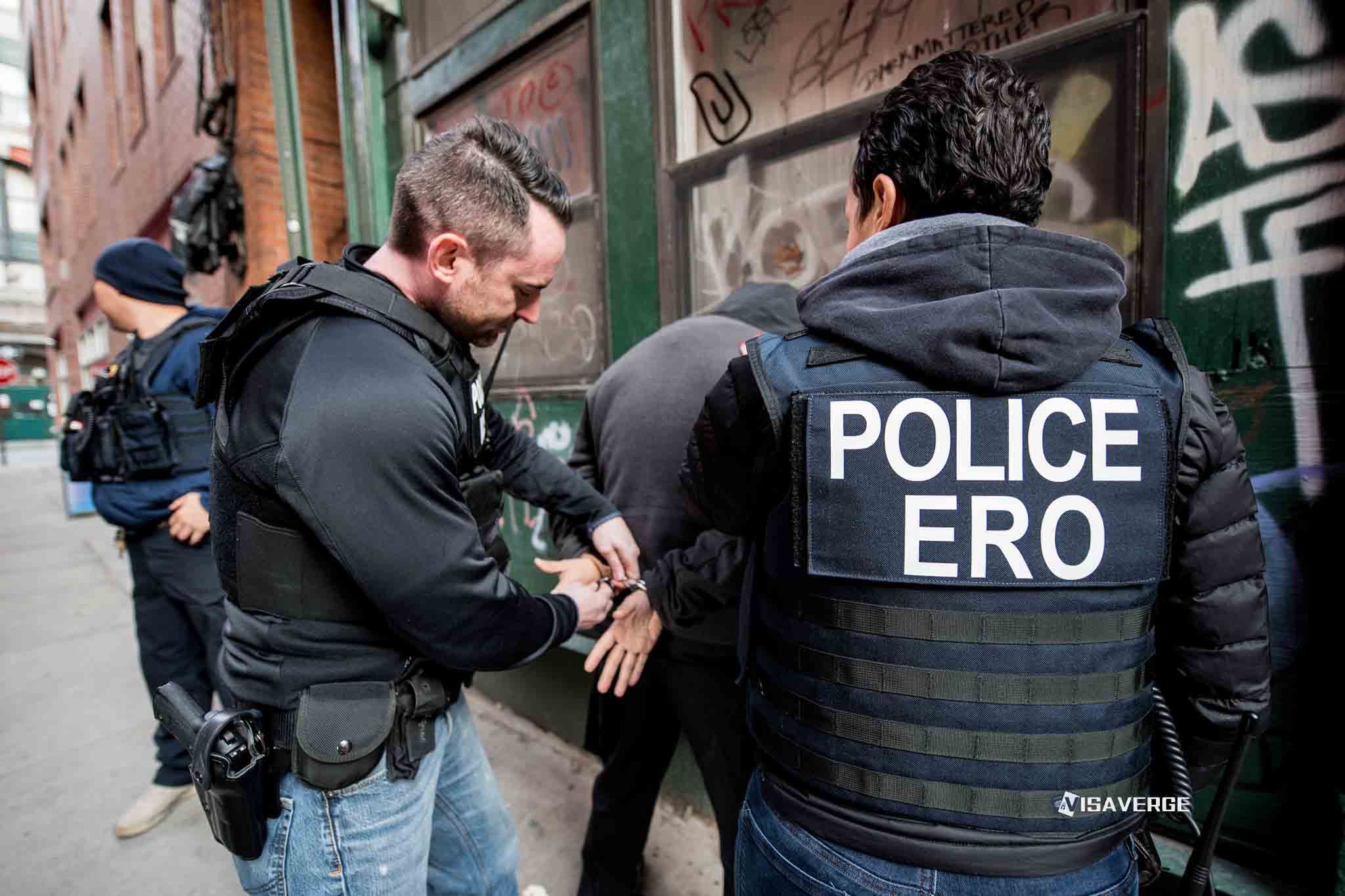Key Takeaways
• A Kansas immigrant with believed protected status was detained by ICE, despite prior assurances from authorities.
• Kansas detention capacity shrank; only Chase County Detention retains ICE contract; Leavenworth reopening faces legal challenges.
• ICE plans nationwide detention expansion; new courthouse arrests risk deporting protected immigrants without hearings.
A Kansas Immigrant’s Detention by ICE Raises Questions About Protected Status and Enforcement
A Kansas immigrant who believed he was protected from deportation was recently detained by Immigration and Customs Enforcement (ICE), according to local reporting. This case, which unfolded in Kansas, has brought renewed attention to the complicated and sometimes confusing nature of immigration enforcement in the United States 🇺🇸, especially as federal priorities shift and local communities grapple with the impact.

Who was detained, what happened, and why does it matter?
The individual, whose name has not been released for privacy reasons, had previously been told by immigration authorities that he had protected status. Despite this, ICE detained him in Kansas, leaving his family and advocates searching for answers. The case highlights how even immigrants who believe they are following the rules can find themselves caught in the web of changing immigration policies and enforcement tactics.
This incident is not isolated. It reflects broader trends in Kansas and across the country, where the Trump administration’s push for increased deportations and expanded detention capacity has created uncertainty for immigrants, their families, and the communities they call home.
Kansas: A Changing Landscape for Immigrant Detention
How has Kansas’s role in immigration detention changed?
Over the past decade, Kansas has seen a dramatic shift in how and where immigrants are detained. At one time, more than a dozen county jails and detention centers across the state had agreements with the federal government to hold people for ICE. Today, only the Chase County Detention Center in Cottonwood Falls maintains an active agreement to detain immigrants for ICE.
This change means that options for holding immigrants in Kansas are now very limited. In February 2025, the Department of Justice signed a six-month deal with the Bureau of Prisons to allow ICE to use a small number of housing units in six federal prisons, including the federal correctional institution in Leavenworth. This move was designed to help ICE manage the growing number of people it is detaining as part of the Trump administration’s pledge to deport 1 million people in his first year back in office.
Why is detention capacity such a big issue?
With President Trump’s administration promising large-scale deportations, there is intense pressure to find enough space to hold people while their cases are processed. However, Kansas’s shrinking number of detention facilities has made this a challenge. The state has become a focal point for debates about how and where immigrants should be detained, and what rights they have while in custody.
The CoreCivic Leavenworth Facility: Legal Battles and Local Resistance
What’s happening with the Leavenworth facility?
A major controversy erupted when CoreCivic, a private prison company, announced plans to reopen its closed Leavenworth prison as an immigrant detention center. The city of Leavenworth responded by filing a lawsuit in March 2025, seeking to block CoreCivic from moving forward with its contract with ICE.
U.S. District Judge Toby Crouse heard arguments on May 26, 2025, and promised a quick decision before CoreCivic’s planned reopening date of June 1, 2025. The city argues that CoreCivic needs a special use permit to operate the facility as a detention center again, while CoreCivic claims that because the prison was used for detention from 1992 to 2021 and never officially closed, no new permit is needed.
CoreCivic’s attorney has suggested that the city’s actions are politically motivated, pointing out that the city only tried to revoke the special use permit after CoreCivic signed a contract with ICE. The city, however, says that CoreCivic initially agreed with their position and even applied for a permit in February before withdrawing the application.
Why does this matter for immigrants in Kansas?
The outcome of this legal battle will determine whether hundreds of immigrants could be detained in Leavenworth in the coming months. For families and advocates, the possibility of reopening the facility raises concerns about conditions inside private detention centers and the impact on local communities.
ICE’s Nationwide Expansion Plans
Is Kansas’s situation unique?
No. Across the United States 🇺🇸, ICE is working to expand its detention capacity. Documents obtained by the American Civil Liberties Union (ACLU) through a Freedom of Information Act (FOIA) lawsuit in April 2025 show that ICE is planning to add detention facilities in 10 states across the Midwest and West Coast.
These documents reveal that ICE is seeking proposals from private prison companies, including GEO Group and CoreCivic, to operate new or expanded facilities. The expansion plans include detailed information about each facility’s capacity, transportation options, proximity to hospitals and immigration courts, and access to consulates and legal services.
The Trump administration has reportedly sought up to $45 billion to fund this expansion, and ICE has released a “strategic sourcing vehicle” inviting contractors to submit proposals for detention and related services.
What are the concerns about expanding detention?
Many of the facilities being considered have faced criticism for past incidents of misconduct and abuse. Advocates worry that expanding detention will put more immigrants at risk of poor treatment, especially as ICE adopts more aggressive enforcement tactics.
New Enforcement Tactics: Arrests at Courthouses
How is ICE changing its approach to enforcement?
Recent reports from May 2025 show that ICE has started arresting immigrants at scheduled court hearings. This tactic is designed to speed up deportations and, in some cases, bypass immigration judges altogether. Critics say this approach puts people with legitimate asylum claims or other legal protections at risk of being deported without a fair hearing.
The administration is also fighting legal battles over its deportation policies. For example, a judge named Murphy has blocked the U.S. from sending migrants to third-party countries without due process. Officials say this has complicated U.S. diplomacy with countries like Libya, South Sudan, and Djibouti.
What does this mean for immigrants in Kansas and beyond?
Immigrants who must appear in court for any reason now face the added risk of being detained by ICE, even if they have pending cases or believe they are protected. This has created fear and confusion in immigrant communities, making it harder for people to access the legal system or seek help when they need it.
Protected Status: Special Immigrant Juvenile (SIJ) and Deferred Action
What protections exist for some immigrants?
Some immigrants, such as those with Special Immigrant Juvenile (SIJ) status, have special protections under U.S. law. SIJ status is for children who have been abused, abandoned, or neglected and cannot be reunited with one or both parents. To apply, individuals must file Form I-360 (Petition for Amerasian, Widow(er), or Special Immigrant) with U.S. Citizenship and Immigration Services (USCIS).
According to USCIS guidance updated in January 2025, most SIJ cases now receive an automatic deferred action determination after approval of Form I-360. Deferred action means that immigration authorities agree not to deport someone for a certain period, giving their case lower priority for enforcement.
USCIS considers all the facts in each case, including positive and negative factors. An approved SIJ classification is a strong positive factor for granting deferred action. However, if background checks show that someone is inadmissible for reasons that cannot be waived (such as certain criminal convictions), this is a strong negative factor.
Why do some immigrants still get detained?
Even with these protections, immigrants can still be detained if there is confusion about their status, if they have not completed all necessary paperwork, or if new enforcement priorities override previous decisions. This is what happened in the Kansas case, where an immigrant believed he was protected but was still detained by ICE.
The Human Impact: Family Separation and Communication Barriers
What happens to families when someone is detained?
The KCUR report shares the story of a woman named Lopez, who tried to find out where a detained man was being held. She faced many obstacles:
- When she called the detention center, staff refused to give information without the man’s alien registration number (A-number).
- An A-number is a unique ID given to nonresidents by USCIS to track their interactions with immigration authorities. Not everyone has an A-number, especially those who entered the country on tourist or business visas or have never dealt with immigration agencies.
- After finally getting the A-number from the man’s family, Lopez called again but was told she needed to call during specific hours.
- While waiting for information, the man’s son, who had a work permit and an active immigration case, traveled to Kay County to visit his father. As of late April 2025, the family had not heard from the son, raising fears that he, too, may have been detained.
How does this affect immigrant families?
These communication barriers and sudden detentions can leave families in the dark, unable to find or contact their loved ones. The uncertainty and fear can be overwhelming, especially for children and spouses who depend on the detained person for support.
Legal Resources and Support for Immigrants
What help is available for immigrants facing detention?
Legal assistance is essential for immigrants dealing with detention or other immigration issues. The USCIS guide for new immigrants recommends contacting local bar associations to find qualified lawyers. Some states, such as California, Florida, North Carolina, and Texas, have lists of certified immigration law specialists on their state bar websites.
For immigrants who are victims of domestic abuse, help is available through the National Domestic Violence Hotline at 1-800-799-7233 or 1-800-787-3224 (for hearing impaired). Assistance is offered in Spanish and other languages. The Violence Against Women Act allows abused spouses and children of U.S. citizens and permanent residents to self-petition for permanent residency.
What should immigrants do if they or a loved one is detained?
– Contact a qualified immigration lawyer immediately.
– Gather all important documents, including any A-numbers, work permits, and court papers.
– Ask for help from local immigrant advocacy groups, who may have experience dealing with ICE and detention centers.
– Keep trying to contact the detention center during the specified hours, and be persistent.
Broader Implications for Kansas and the United States 🇺🇸
What does this case tell us about immigration policy today?
The detention of a Kansas immigrant who believed he was protected shows how quickly things can change under shifting federal priorities. As reported by VisaVerge.com, even immigrants with pending cases or special status can find themselves at risk if enforcement tactics change or if there is confusion about their paperwork.
The legal battles over detention facilities, the expansion of ICE’s capacity, and the new enforcement tactics all point to a system in flux. For immigrants, this means more uncertainty and a greater need for reliable information and legal support.
What can communities do?
– Stay informed about changes in immigration law and enforcement in your area.
– Support local organizations that help immigrants and their families.
– Encourage open communication between local officials, law enforcement, and immigrant communities to build trust and ensure everyone knows their rights.
Actionable Takeaways
- If you or someone you know is an immigrant in Kansas or elsewhere in the United States 🇺🇸, keep all immigration documents up to date and accessible.
- Know your A-number, if you have one, and share it with trusted family members.
- If you are detained or face legal trouble, contact a qualified immigration lawyer as soon as possible.
- For information about your rights and available resources, visit the official USCIS website.
- If you are a victim of domestic violence, call the National Domestic Violence Hotline for confidential help.
The situation in Kansas is a reminder that immigration policy is not just about laws and regulations—it’s about real people, families, and communities. As enforcement priorities shift and legal battles continue, staying informed and prepared is more important than ever for immigrants and those who support them.
Learn Today
ICE → Immigration and Customs Enforcement, a U.S. agency enforcing immigration laws and detaining undocumented immigrants.
Protected Status → A legal designation granting certain immigrants temporary relief from deportation under specific conditions.
Special Immigrant Juvenile (SIJ) → Status for abused or neglected immigrant children, offering legal protections and potential residency pathways.
Deferred Action → Temporary immigration relief delaying deportation but not granting permanent legal status.
A-number → Alien registration number assigned by USCIS to track immigrants’ immigration records and cases.
This Article in a Nutshell
A Kansas immigrant’s unexpected ICE detention exposes confusion over protected status and enforcement amidst expanding detention facilities nationwide and shifting federal immigration priorities.
— By VisaVerge.com








